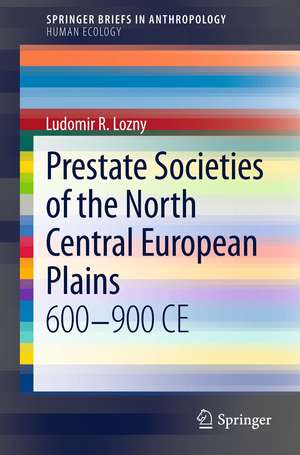Prestate Societies of the North Central European Plains: 600-900 CE: SpringerBriefs in Anthropology
Autor Ludomir R Loznyen Limba Engleză Paperback – 16 apr 2013
Preț: 343.72 lei
Nou
Puncte Express: 516
Preț estimativ în valută:
65.77€ • 68.84$ • 54.74£
65.77€ • 68.84$ • 54.74£
Carte tipărită la comandă
Livrare economică 31 martie-14 aprilie
Preluare comenzi: 021 569.72.76
Specificații
ISBN-13: 9781461468141
ISBN-10: 1461468140
Pagini: 108
Ilustrații: XIII, 94 p. 16 illus., 14 illus. in color.
Dimensiuni: 155 x 235 x 6 mm
Greutate: 0.16 kg
Ediția:2013
Editura: Springer
Colecția Springer
Seriile SpringerBriefs in Anthropology, SpringerBriefs in Human Ecology
Locul publicării:New York, NY, United States
ISBN-10: 1461468140
Pagini: 108
Ilustrații: XIII, 94 p. 16 illus., 14 illus. in color.
Dimensiuni: 155 x 235 x 6 mm
Greutate: 0.16 kg
Ediția:2013
Editura: Springer
Colecția Springer
Seriile SpringerBriefs in Anthropology, SpringerBriefs in Human Ecology
Locul publicării:New York, NY, United States
Public țintă
ResearchCuprins
Chapter One: Introduction.-Chapter Two: Social change in the North Central European Plains, 600-900s CE: archaeological data Chapter Three: The rise of social complexity in the NCEP, 600-900s CE: processual analysis.-Chapter Four: Social dynamics of the North Central Europea.-n Plains, 600-900s CE: a model.-Chapter Five: Conclusions.-Index.
Recenzii
From the book reviews:
“The book offers new knowledge and opens up new avenues for further research on the emergence of social complexity in general. It will, no doubt, find a place on the bookshelves and desks of specialists in the European Middle Ages, but also archaeologists, cultural anthropologists, and historians who search for new approaches to study historical dynamics of sociopolitical organizations.” (Dmitri M. Bondarenko, Human Ecology, Vol. 42, 2014)
“The book offers new knowledge and opens up new avenues for further research on the emergence of social complexity in general. It will, no doubt, find a place on the bookshelves and desks of specialists in the European Middle Ages, but also archaeologists, cultural anthropologists, and historians who search for new approaches to study historical dynamics of sociopolitical organizations.” (Dmitri M. Bondarenko, Human Ecology, Vol. 42, 2014)
Textul de pe ultima copertă
This volume offers a new perspective on social dynamics and culture change in the North Central European Plains (NCEP) from 600 to 900 CE. Using archaeological evidence, this volume follows and analyzes the rise of social complexity in this region. It discusses long-term causal processes leading to the formation of state at the fringes of the Merovingian and Frankish Kingdoms, the Carolingian and the Holy Roman Empire, the Scandinavian Kingdoms, the Czech Kingdom, and the Kingdom of Rus.
The central problem addressed is accounting for and explaining the transition from noncomplex to supra-tribal polities between 600 and 900 CE. The examined evidence shows that a very basic community-level management of common pool resources seems a successful strategy to manage short term risk and may lead to sustainable higher level political organization. In conclusion it present a models of social dynamics of the NCEP, 600-900 CE that suggests that the state formation process was an outcome of spontaneous processes and deterministic factors occurring within a period of approximately 400 years, of which the last two hundred years (800-900 CE) were the most critical. In a broader context, the point discussed is that societal decisions with short-term goals have long-term consequences.
The central problem addressed is accounting for and explaining the transition from noncomplex to supra-tribal polities between 600 and 900 CE. The examined evidence shows that a very basic community-level management of common pool resources seems a successful strategy to manage short term risk and may lead to sustainable higher level political organization. In conclusion it present a models of social dynamics of the NCEP, 600-900 CE that suggests that the state formation process was an outcome of spontaneous processes and deterministic factors occurring within a period of approximately 400 years, of which the last two hundred years (800-900 CE) were the most critical. In a broader context, the point discussed is that societal decisions with short-term goals have long-term consequences.
Caracteristici
Presents a model of social dynamics of the North Central European Plains Offers a new perspective on social dynamics and culture change in the North Central European Plains Explores the transition from noncomplex to supra-tribal polities between 600 and 900 CE

























